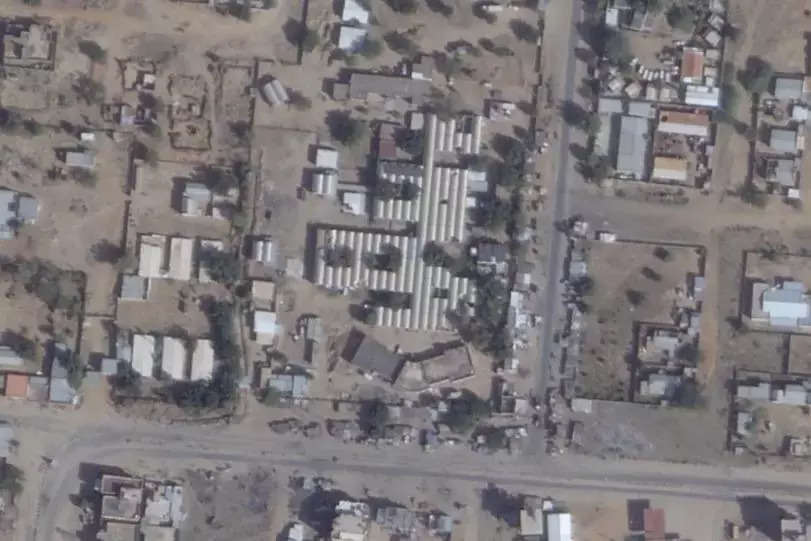Horrific Attack on El Fasher Hospital: 70 Dead, World in Shock
The world reels in horror after a devastating attack on the only functioning hospital in El Fasher, Sudan. In a heart-wrenching tragedy, at least 70 lives were lost, and 19 more were injured – patients, staff and even those seeking refuge. This horrific act of violence against a medical facility is a crime against humanity and raises profound questions about the ongoing conflict in Darfur. The attack serves as a stark reminder of the utter devastation and relentless cruelty facing innocent civilians caught in the crossfire.
The Devastating Aftermath: A City Under Siege
The assault on the Saudi Hospital in El Fasher was brutal and swift, targeting a facility overflowing with patients. Survivors describe scenes of unimaginable chaos, with people desperately trying to escape amidst gunfire. This targeted attack not only robbed numerous individuals of their lives but left a gaping hole in an already fragile healthcare system, already stretched to its breaking point due to the ongoing conflict in North Darfur. The aftermath of this savage act is beyond comprehension: families mourn their losses, survivors grapple with their physical and emotional scars, and the people of El Fasher are left wondering what may happen next. Local officials quickly raised the alarm, issuing statements outlining the immense losses endured by the besieged community.
A Healthcare System Crumbling Under Attack
This act is not only a tragedy for its victims, but also constitutes a critical blow to the very foundation of society and well-being. The relentless conflict and repeated attacks on vital infrastructure demonstrate the extent of the crisis unfolding in Darfur. Access to healthcare is an absolute necessity, particularly for vulnerable populations, yet the brutal targeting of hospitals undermines these desperately needed healthcare facilities, threatening the stability of the entire region and rendering medical care practically inaccessible for civilians caught in the conflict's shadow. It has now put further stress on what healthcare services remain available.
Identifying the Perpetrators: A Call for Accountability
While international confirmation of the casualty figures arrived through the statement released by WHO Director-General Tedros Adhanom Ghebreyesus, the responsibility for this egregious attack remains officially undetermined. Initial reports from local officials pointed the finger toward the Rapid Support Forces (RSF) rebels, accusing them of carrying out this horrific act of violence against civilians. Although these accusations remain unconfirmed, RSF has also faced other accusations and credible reports detailing its aggressive behavior in El Fasher and other areas during recent months, intensifying anxieties about ongoing safety issues in this devastated region. Such actions severely undermine the peace process, with potential lasting effects across multiple international bodies. A failure to effectively investigate the events could lead to continued acts of impunity and violence in the ongoing conflicts within Sudan.
The Urgent Need for International Intervention
The lack of official confirmation of the perpetrators demands swift, decisive action from the international community. A comprehensive investigation is vital to deliver justice to the victims of this tragedy and prevent any repeat of similar attacks. Global intervention isn't merely important; it’s crucial to halting such heinous violations of human rights and holding those responsible accountable for their actions, while providing necessary humanitarian relief and facilitating peace. The situation continues to demand international action and demands intervention for all involved and affected by these tragedies. Without it, more victims of this conflict could soon become statistics of violence.
The Humanitarian Crisis Deepens: Urgent Assistance Needed
This attack underscores the dire humanitarian situation in Darfur, exacerbating an already catastrophic crisis marked by widespread violence and displacement. Millions of innocent civilians face shortages of food, water, and medical supplies, trapped amidst armed conflicts and fearing for their safety. The need for urgent assistance cannot be overstated, from medical supplies and relief efforts to the long-term reconstruction of devastated healthcare facilities and affected communities. Organizations offering support for humanitarian relief have intensified their aid packages but still require much more.
The Long Road to Recovery
The journey back to even a semblance of normalcy will be long and arduous. The healing process must extend far beyond the physical scars; it must encompass rebuilding trust, facilitating reconciliation among traumatized communities, and fostering reconciliation. This needs effective and responsible strategies with lasting effects throughout communities affected by ongoing conflict. Any meaningful progress toward resolution must not only prioritize security and safety, but also ensure sustainable solutions to prevent similar tragic occurrences from happening again.
Take Away Points
- The attack on El Fasher Hospital was a horrific crime against humanity, resulting in the deaths of 70 people and leaving many more injured.
- The perpetrators remain unidentified, but the RSF is suspected, while international authorities still officially determine responsible parties.
- This tragedy underscores the dire humanitarian crisis in Darfur, highlighting the urgent need for international intervention, sustainable solutions, and responsible rebuilding efforts that address the ongoing conflict and foster reconciliation among all affected communities.
- Swift accountability and a transparent investigation are paramount in preventing similar atrocities from occurring again.




